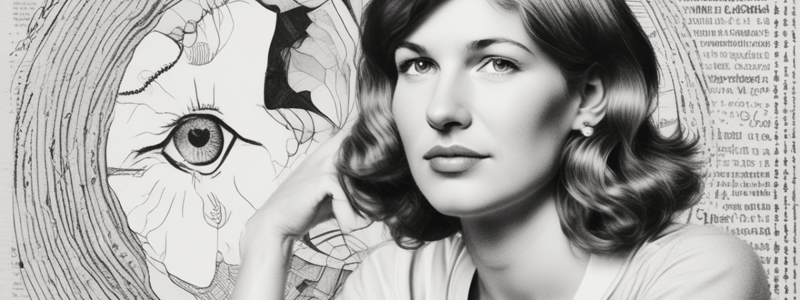Podcast
Questions and Answers
What is the central idea behind the metaphor in the third stanza of the poem, and how does it relate to the theme of identity?
What is the central idea behind the metaphor in the third stanza of the poem, and how does it relate to the theme of identity?
The metaphor suggests that the speaker is no more her mother than a cloud that has produced a body of water, highlighting how she sees herself differently as a mother, and her old identity is being worn away. This relates to the theme of identity as it showcases how motherhood brings a new identity and a shift in self-perception.
What does the use of kinesthetic imagery in the line 'A far sea moves in my ear' convey about the speaker's emotions?
What does the use of kinesthetic imagery in the line 'A far sea moves in my ear' convey about the speaker's emotions?
The use of kinesthetic imagery conveys the speaker's anxiety and fear as a mother, as she is attuned to her baby's needs and is waiting to respond to her cries.
What does the speaker's description of herself as 'cow-heavy and floral' in her 'Victorian nightgown' reveal about her self-perception?
What does the speaker's description of herself as 'cow-heavy and floral' in her 'Victorian nightgown' reveal about her self-perception?
The speaker's description reveals her honesty and candor about her physical appearance as a mother, and how she is embracing her new role, despite feeling perhaps unflattering or awkward.
How does the image of the daughter's mouth 'opening clean as a cat's' contribute to the overall tone of the poem?
How does the image of the daughter's mouth 'opening clean as a cat's' contribute to the overall tone of the poem?
What is the significance of the 'clear vowels' and 'balloons' in the final stanza of the poem?
What is the significance of the 'clear vowels' and 'balloons' in the final stanza of the poem?
Flashcards are hidden until you start studying
Study Notes
Morning Song by Sylvia Plath
- The poem is a celebration of the birth of Plath's daughter, Frieda, and explores the themes of maternal love, womanhood, and motherhood.
Literary Devices
- Expert use of figurative language, including similes, metaphors, and conceits
- The poem is structured into tercets, with three lines per stanza
- Carefully placed caesura to allow for reflection
- Imagery: auditory, visual, and kinesthetic
Analysis of Key Quotes
- "Love set you going like a fat gold watch": original painterly simile showcasing adulation for her new child
- "The midwife slapped your foot soles, and your bald cry / Took its place among the elements": use of auditory imagery to bring the moment to life
- "We stand round blankly as walls": anxiety and reverence in the presence of the new child
- "I'm no more your mother / Than the cloud that distills a mirror to reflect its own slow / Effacement at the wind's hand": profound conceit exploring the theme of identity and motherhood
- "All night your moth-breath / Flickers among the flat pink roses": maternal instinct and opposing emotions in motherhood
- "One cry, and I stumble from bed, cow-heavy and floral / In my Victorian nightgown": honest self-depiction and assumption of a timeless role
- "The clear vowels rise like balloons": euphonic assonance and visual imagery conveying joy and love for her daughter
Studying That Suits You
Use AI to generate personalized quizzes and flashcards to suit your learning preferences.




